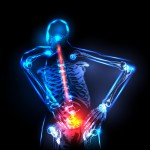
The elves have heard people talking about treatments that aim to change the wiring in your brain and this sparked our interest in whether they work for chronic low back pain. We found this useful systematic review of cortical remapping interventions for pain and disability in chronic low back pain. I will talk you through what the authors did and found.
Here’s what they did
The authors searched electronic databases up to September 2013 for studies in any language that included adults with chronic low back pain (CLBP), defined as low back pain persisting longer than 3 months.
Treatment interventions included graded motor imagery (GMI), mirror visual feedback therapy (MVF) and sensory discrimination retraining (SDR) or similar and could be delivered together.
The effects of these intervention were compared with current practice and the primary outcomes measured were pain, disability and cortical imaging as a measure for cortical remapping.
Here’s what they found
- 5 studies were included in the review (183 participants) – 3 randomised controlled trials (RCTs), 1 randomised cross‐over study, and 1 multiple case study design.
- Sensory discrimination retraining: no difference in pain, physical, emotional functioning or disability after 12 or 24 weeks of intervention
- Mirror visual feedback therapy: reductions in pain intensity and duration with repeated lumbar movements using mirrors
- Graded motor imagery: changes in the motor cortex mapping towards what is seen in healthy participants
- Combination approach: reduction of pain intensity, pain interference and disability after 10 weeks and this was maintained at 20 weeks follow-up but only evidence from 3 participants
The authors concluded
Management strategies such as sensory discrimination retraining, graded motor imagery, and mirror visual feedback which specifically aim to drive adaptive cortical neuroplasticity to redress these changes have been shown to be effective in other pain conditions.
The Musculoskeletal Elf’s view

We know chronic low back pain is a debilitating condition associated with changes within the brain (cortocal remapping). Strategies have emerged that focus on reducing these changes within the brain and the basic science is encouraging. Further high quality studies are required to fully examine the effect of these strategies on chronic low back pain, specifically trials that rigorous recruitment, randomisation and blinding of a suitable sample.
What do you think?
- Do you have experience of cortical remapping interventions?
- What are your views on this type of intervention?
Send us your views on this blog and become part of the ever expanding Musculoskeletal Elf community. Post your comment below, or get in touch via social media (Facebook, Twitter, LinkedIn, Google+).
Links
- Daffada PJ, Walsh N, McCabe CS, Palmer S. The impact of cortical remapping interventions on pain and disability in chronic low back pain: a systematic review.Physiotherapy. 2015 Mar;101(1):25-33. doi: 10.1016/j.physio.2014.07.002. [abstract]
- PRISMA statement
- EQUATOR Network


Cortical remapping interventions for chronic low back pain http://t.co/a6CWORgFe3
Cortical remapping interventions for #chronic #LowBackPain http://t.co/qLw6oyauEe @theCSP @thecspstudents
@GCUPhysio very own @chrisseenan blog post at @MSK_Elf Cortical remapping interventions for chronic low back pain https://t.co/ica9h1hDHz
Cortical remapping interventions for #chronic #LowBackPain http://t.co/qLw6oyauEe @PhysioPainAssoc @painPhysio @PhysioMACP
#chronic #LowBackPain & Cortical remapping interventions http://t.co/I4VNEEaJIw @CochraneBack @CochraneConsumr
#chronic #LowBackPain & Cortical remapping interventions http://t.co/qLw6oyauEe @BackPainToolkit @PhysioTalk
#chronic #LowBackPain & Cortical remapping interventions http://t.co/qLw6oyauEe @CochranePaPaS @CochraneMSK